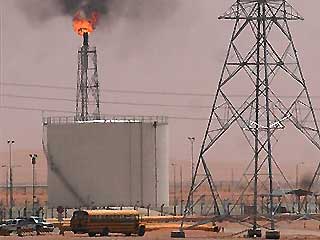
With uprisings continuing to sweep across the Middle East, there wasn’t much in today’s first hour of MPR’s Midday to make us think someone at the Pentagon isn’t dusting off plans to take over Saudi Arabia’s oil fields. You know, just in case.
Michael Barnett, author of “Dialogues in Arab Politics,” seemed to stun even host Gary Eichten — and, presumably, much of the listening audience — today when he matter-of-factly described a scenario for any uprising in Saudi Arabia by forces not friendly to the United States.
“What defense strategists have planned,” Barnett said, “is if we were to see a rebellion … If the Saudi government were to topple, it would not necessarily break in a way that the Americans would favor. The contingency plans would be to try to go in and… not take over the government, but try to protect the oil fields. So the expectation then is that American troops would be dispatched to protect those oil fields and control them and basically claim jurisdiction over them until you can begin to have a stable government that is moderately pro-U.S. or at the very least is willing to sell Americans oil.”
Those have been the plans since the 1973 Arab oil embargo, according to Barnett. “That’s not a new strategy,” he said. No, but it’s one that seems more possible these days.
The good news, according to an NPR report today, is that Saudi Arabia is a different beast than other nations in the region:
Thomas Lippman, an analyst at the Council on Foreign Relations who has written extensively on Saudi Arabia, says he strongly doubts that there will be unrest in the kingdom “because no one questions the legitimacy of the regime, and the king is personally popular.” Yes, Saudi Arabia has problems, Lippman says, “but the place is not stagnant as Egypt was. Everyone knows there is going to be change in the next few years” as the older members of the royal family die off.
There have been a few, very limited signs of unrest in Saudi Arabia — isolated reports of Saudis demonstrating for better pay, some criticism of the royal family on the Internet, heated political discussions among the country’s large Shiite minority. These incidents, and the general sense of uncertainty hanging over the entire Middle East, are already driving the price of oil upward.
Barnett’s segment on Midday is well worth listening in its entirety, if only to begin to understand the complexities facing the United States and the realities it faces in the region. For example, one caller — Hassan — called to say Libya presents a “great opportunity” for the United States to show the Arab world that it cares about people by intervening militarily in the strife (mighty generous with other people’s kids, there, Hassan).
“If you intervene in Libya, then why aren’t you intervening in Bahrain? Or are you simply giving encouragement to the green revolution in Iran, and encourage protesters in Iran to believe there might be an American intervention and embolden them when in fact the United States might have no interest in intervening militarily to protect protesters in Iran,” Barnett said.
“I’m all for the U.S. being a force for good,” another caller said, “I wonder about the extent to which the U.S. is viewed in the world, if we were to plop down 20,000 soldiers in Libya, I think it would be widely perceived as a power grab for Libya’s oil.”
“If the Americans were to go charging in, they’d be stigmatized,” Barnett acknowledged. He said the U.S. would have to take a backseat to the Europeans, who don’t like taking “a command position.”
